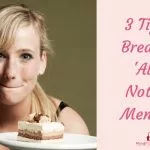Mindset shifts can be transformational for many aspects of our lives. Creating a healthy relationship with food has less to do with food and more to do with thoughts, mindset and our way of living. Often, when we are trying to change our body or our way of eating, we go on a diet. The problem here is, though, that dieting slows our metabolism, leads to binging and disconnect us from natural bodily signals. Furthermore, they are generally very unhealthy. So, instead of ineffective diets or calorie counting, let us make a powerful mindset shifts for lasting change.
This blog will explore empowering mindsets shifts to feel easy around food and cultivate a life of health and wellbeing; without the need of eliminating whole food groups or living in self-torture or self-deprivation. And let’s face it, who wants that? Personally, I enjoy my food too much.

Why We Eat What We Do
I have studied why people overeat, binge eat or restrict food for numerous years now. Through helping myself and others, I confidently believe that none of us are lazy or lacking self-control. Some people use food to numb out (using food as a drug), for entertainment (when bored), or even to feel more in control of their life. When there are areas of in our life we feel out of control, we use food to change how we feel or to control our body size. I personally, for many years was controlling my body size because I subconsciously believed that I will be loved more if I am thin. Further, many of us use food to avoid uncomfortable feelings (emotional eating). There are various reasons why we eat certain foods.
Certainly, one key to health and wellbeing involves cultivating and practicing powerful mindset shifts alongside deeper work underpinning our own psychology.
4 Powerful Mindset Shifts
1. Clarity on WHY
Reasons come first, strategy comes second.
Why do you want to change your eating habits or your body? Make a list and read this every single day. I recommend making your reasons not appearance-based, and more feeling based as this is more likely to provide long-term motivation. Even more, make your WHY kind and loving as this is more likely to stick. We want to create an environment we can thrive in, that’s why negative self-talk doesn’t have space here. Do you want more energy so you can play with your kids? Are you after more health to live a more vital life? Do you want more flexibility? Find your WHY. Imprinting this WHY in your mind daily will help motivate you. In this way, it will underpin your thoughts and consequently affect your feelings and behaviours around food.

2. Understanding the Process: Think-Feel-Behave
I talk a lot about the TFAR Concept. Our thoughts affect our feelings, our feelings affect our actions and they create certain results. If our inner dialogue is “Oh my day was so stressful and I can’t handle it! I deserve to eat junk food for dinner”, we allow these thoughts to generate emotions of ‘poor me’, and thus our behaviour will reflect this. How about we say something more empowering like “Wow, today was HARD, I am overwhelmed and need to find a way to take care of myself.” We are more likely to feel in control and confident, and consequently, make better decisions that are aligned with our goals and our ‘Why’. Re-framing negative-self talk can be transformational!

3. Reclaiming Power
Another mindset shift is reclaiming the power back from food. Let’s stop categorising food as ‘good’ or ‘bad’, or ‘right’ or ‘wrong’. Granted, it is human nature to categorise like this, and we all do it to an extent. But at the end of the day food is made up of the same stuff; molecules. Yes, the green smoothie and the chocolate ice-cream are both made up of molecules. Some foods just nourish our body more than other foods. Likewise, there are merely nutrient-dense foods and less nutrient-dense foods. That’s why I like talking about most-of-the-time-food and sometimes-food.
Furthermore, what is more empowering than moral judgments around our eating, is creating a beautiful vision for how you want your relationship to food to look like and feel like. Judging food as naughty and bad only gives it more power! If we believe we can’t eat ice cream without over-doing it, then we will. A mindset shift is key here. Tell yourself, “I can eat ice-cream at times if this is what would really satisfy me”.
4. Ask Better Questions
Clients regularly come to me wanting a diet plan or asking what they need to eat. But usually, these people already know what to eat, they are just not doing it. Instead of a diet or ‘plan’, I get them to put their detective hat on and become curious about their eating. I encourage them to understand why, how and when they eat. This helps us get to the root causes.
The power resides in better questions about why we eat what we do. To change patterns we need awareness. But for the awareness, we need wholehearted acceptance of where we are currently at. From this space of truth, change can be cultivated. What is your truth around eating? The following inquiry questions will help you access this place of truth.

INQUIRY QUESTIONS
- Am I actually hungry? What are my physiological hunger signs (lightheadedness, grumbling stomach, headache, grumpiness)? Is that what I’m feeling?
- What am I hungry for – is it really food or something else?
- If I don’t need food, what do I need?
- What’s missing that I’m trying to fill with food? Is it something to do? Am I lacking energy? Is it company?
- What am I feeling and why? Is there sadness? Uncertainty? Nerves?
- How can I satisfy my needs and desires in other ways other than food? Should I call a friend so I’m not so lonely? Do
I need to occupy myself so I’m not bored? Will more sleep help? Should I reduce my stress so I don’t look to food for a boost?
These inquiry questions will generate awareness and create a change in thoughts around food and consequently our behaviours – as we tap into the underlying emotional triggers.

Power of Mindset Shifts
You will be amazed at how your body and your relationship with food starts naturally changing when you incorporate these mindset shifts. Also, the wonderful part is, we can consciously allow ourselves to indulge in ice cream (or ANY food for that matter), from time to time. Making mindset shifts are integral to eating intuitively. Eating intuitively allows body-mind connection around food. It helps us re-learn how to tap into what our body is trying to tell us. Certainly, food is not the enemy. We all deserve a vital and joyful life!
For the 10 Principles of Intuitive Eating and more information on this topic, click here. If you love podcasts like me, check out Nutrition Matters Podcast – hosted by dietitian Paige Smathers. She does a fantastic job anticipating listeners concerns and questions and addressing them with thoughtfulness and compassion for anyone who is new on this journey. This is a recent podcast discussing Mindfulness and Intuitive Eating.
Episode 151: The Distinction Between Mindfulness and Intuitive Eating

If you feel overwhelmed with your relationship with food and would like to understand why you know what to do, but just can’t seem to be able to change it. Book a free call with me today and let’s discuss your biggest challenges, what you desire for yourself and how I can help you to overcome your roadblocks so that you can finally get from you are now to where you want to be faster and easier.




